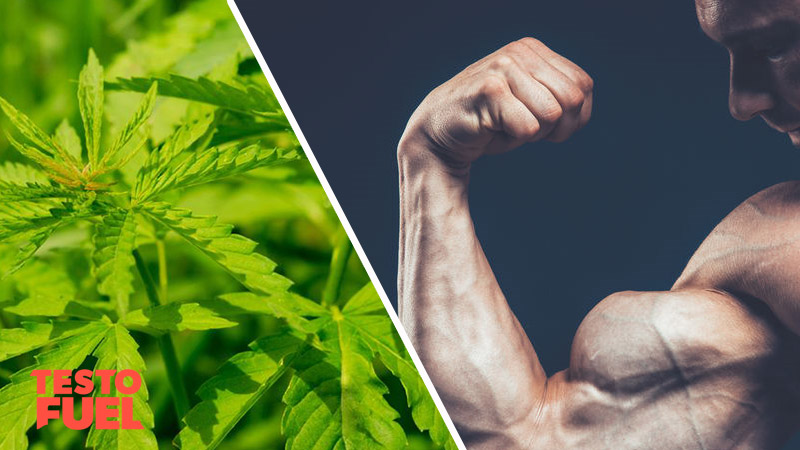TestoFuel Blog : Make Gains & Pack on the Muscle

In the quest for increasing strength and muscle mass you need to not only train hard and eat well, but also be aware of how your overall lifestyle might affect your gains.
Whilst debate rages on regarding the use of cannabis oil to treat physical and psychological illness, or the implications of recent legalization changes, this article looks specifically at the research on the effects of the weed plant on testosterone and other markers of male fertility.
Will recreational drug use affect your gains? Read on to find out…
In this article we’ll cover?
Marijuana is the dried and shredded leaves of the hemp plant – Cannabis sativa, and is green-grey in color. Common, street names include weed, pot, dope, bud and ganja amongst many others.
There are a number of compounds in the cannabis plant, many of which are classed as cannabinoids, but the main psychoactive compound that we are interested in here is called delta-9-tetrahydro-cannabinol, or ‘THC’. This is the compound that triggers nerve receptors to provide a mood altering effect and make you feel ‘high’.
Different parts of the plant have different THC content, with the flowering ‘buds’ and leaves having the highest concentrations, and the stalks and seeds having much lower values.
According to Brown et al [1], THC has widespread effects on multiple hormonal systems, including gonadal, adrenal, prolactin, growth hormone, and thyroid hormones.
But does it affect T levels? Read on to find out…
Key Point: Marijuana is a naturally occurring plant that contains an active compound called THC – a psychoactive cannabinoid.
Interest in how the drug might have a clinical impact on testosterone levels began with the publication of a study in the New England Journal of Medicine in the 1970s [2]. In their research the authors of the study suggested that cannabis adversely affected hormone production leading to diminished testosterone levels. They also suggested that it led to gynecomastia – or man boobs.
From that point on, there was an obvious interest in the area of research as many researcher tried to find out for sure – this led to an influx of studies through to the 1990s. Most of those studies however failed to find any significant relationship with male breast tissue or indeed T levels.
For example, one of the studies from 1974 [3] pointed to a lack of relationship between T levels and cannabis use in an investigating into pot smoking on T levels over a 21 day period. On average the volunteers of the study smoked 54 cigarettes each over the study period so they were more than just ‘occasional’ smokers.
Similar results were reported in a 1991 study [4], where the authors wanted to investigate the effects of chronic weed use on reproductive and stress hormones. It was a big study, using 93 men and 56 women who were categorized based on how frequently they smoked- frequent, moderate, infrequent and non-users.
The result of the study found no significant effect on any hormone concentrations across groups. This included not only testosterone, but also follicle stimulating hormone, cortisol and luteinizing hormone.
Not all studies reported insignificant findings though- one study [5] found that in men aged between 18 and 28 years who smoked cannabis at least four days a week for a minimum of six months, T levels dropped from 742 to 416ng/dL.
Whilst still in the ‘normal’ category of testosterone levels, it is very close to the cut off for ‘hypogonadism’ of 300ng/dL. This is more or less an exception when it comes to human studies though.
Key Point: Research suggests that marijuana use has little to no effect on testosterone levels.
Not quite.
Whilst T levels seem to be largely unaffected, you still need to be aware of the potential effects of cannabis on other markers of male health such as fertility and sperm quality.
A large study conducted in Denmark in 2015 [6], analysed reproductive hormones and semen quality in 1,215 men – they found that in those that reported smoking the herb more than once per week, sperm concentration were 28% lower. This rose to 55% when the drug was combined with other recreational drugs such as alcohol.
These results were echoed in a similar study published in the same journal. In this study, men who reported daily weed use displayed significant lower semen concentration and sperm counts compared with nonusers – interestingly though they reported higher T levels.
Additional studies have found that THC can have adverse effects on a number of markers of fertility including sperm motility, capacity, quality and count – all important if you are planning a family or want to preserve your male health.
It is advised by many health boards, including the American Society for Reproductive Medicine, that recreational drug use should be quit immediately due to effects on sperm function.
Marijuana is a plant that is dried and used as a psychoactive – the active compound that provides the ‘high’ is referred to as THC.
In the mid 1970s a research paper proposed links between the use of marijuana, diminished testosterone and gynecomastia. This led to a spike in research projects up to the 1990s with people trying to see if the results were in fact significant.
Whilst there have been one or two studies reporting an association between weed and decreased T levels, the majority of research shows that there is little to no effect on not only testosterone levels, but other sex hormone sub sets either.
One thing that does appear certain though is the effects of cannabis on sperm quality and fertility, with research suggesting that regular use of the drug can make sperm less fertile, lower sperm count and ultimately lead to infertility in men.